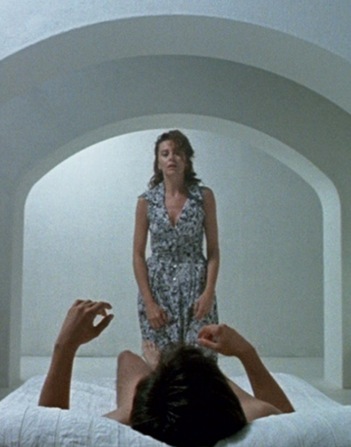Friday, May 3, 1991.
WHITE ROOM. Music by Mark Korven. Co-produced, written, edited and directed and edited by Patricia Rozema. Running time: 110 minutes. 14
Years Limited Admission with the B.C. Classifier's warning: occasional
violence, nudity, suggestive and very coarse language.
AROUND AND AROUND it goes. The problem with art is that artists have problems.
In the case of Norman Gentle (Maurice Godin), the problem is writer's block. Or, as the narrator of White Room puts it, "once upon a time there was a young man who led a very exciting life.
"The problem was it was all in his head."
A nice suburban sort, Norman has trouble expressing his inner vision. "When he tried to put words to it, it all slipped away."
There comes a time, in the film, when Norman finds his muse. Strolling in a forest glade, he turns to the woman who has set his creative juices flowing.
"Okay," he says, declaring himself with introspective intensity. "I'm going to act on a need."
Jane (Kate Nelligan) stands her ground, unshaken by the young man's verbal fervour. "You don't care if it's a mutual need?"
"I'm sorry," Norman says, retreating slightly. "Of course I do."
"Well," says Jane, now in full control of the situation, "it is."
Unblocked, Norman spends that night in fevered composition, the words pouring forth in a torrent. An image of Jane's eye fills the screen and we see fireworks exploding in its pupil.
A original, wonderfully romantic moment, it stands in marked contrast to the film's generally dark, derivative tone. We remember that Norman, the would-be writer, was introduced as your standard creepy peeper, a voyeur given to prowling about his neighbourhood after dark.
"Slowly," our narrator advises us, "Norman the gentle slipped into the darker side of curiosity." One night, he sees a woman raped and murdered in the bedroom of her glass-walled mansion.
Does our hero call the cops?
No.
Frightened and guilt-ridden, Norman rushes home, locks himself in his room and flagellates himself with some handy thorny rose stems instead.
And, wouldn't you know it? The victim, a reclusive pop star named Madelaine X (Margot Kidder), is on record as having told an interviewer that she might "fake her own death" to preserve her privacy.
Around and around.
In White Room, writer-director Rozema reinvents the wheel. Looking for a subject after the success of her 1987 debut feature, I've Heard the Mermaids Singing, she came up with "a chilling exploration of the relationship between the watcher and the watched."
In doing so, she set off down a well-travelled path, one that's recently attracted the likes of David Lynch (Blue Velvet, 1986) and Brian De Palma (Blow Out, 1981; Body Double, 1984).
It would be nice to report that Rozema's professionally crafted feature breaks new psychological ground and opens up exciting new emotional vistas. Unfortunately, she merely reworks familiar material in the manner of a bright film school student producing a thesis feature.
White Room is a film that shows its maker's promise rather than her originality.
The above is a restored version of a Province review by Michael Walsh originally published in 1990. For additional information on this archived material, please visit my FAQ.
Afterword: For the Ontario-born Patrica Rozema, White Room fit the definition of sophomore slump. Her debut feature,1987's I've Heard the Mermaids Singing, was an international success, the winner of the Prix de la Jeunesse at the Cannes Film Festival, and a distribution deal from the U.S.-based Miramax Films. It placed ninth on the Toronto International Film Festival's 1993 list of the Top 10 Canadian Films of All Time, and its nine Genie Award nominations were nice, too. Then came White Room, a picture that took itself more seriously, offering not laughs but Atom Egoyan-like angst. In 1998, Rozama took the opportunity to direct a feature film adaptation of Mansfield Park. She rose to the challenge magnificently, producing a perfectly pitched, if revisionist, portrait of Fanny Price (Frances O'Connor), making Jane Austen's most retiring heroine more interesting than anyone ever imagined.
